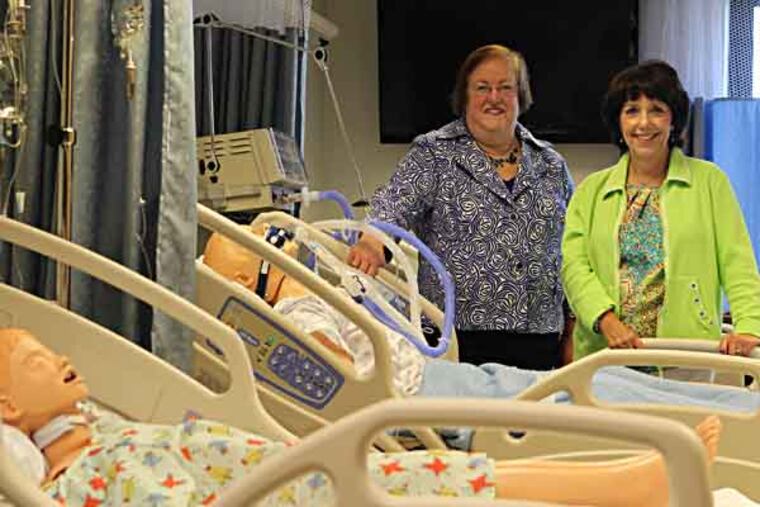Rutgers-Camden blazes trails in nursing education
When Rutgers-Camden opened its School of Nursing two years ago, it decided to focus on the future: what nursing would look like and what it would need.

When Rutgers-Camden opened its School of Nursing two years ago, it decided to focus on the future: what nursing would look like and what it would need.
That meant jettisoning plans for a master's degree program that could be completed in a year or 18 months, offered at other nursing schools, and instead developing a doctoral program that would take twice that long.
"We really struggled with, should we get primary-care-provider nurses, these advanced-practice nurses, out on the street quick, quick, quick with a master's degree, which would be about half the time?" said Joanne P. Robinson, the school's dean. "But we thought the degree of the future, the degree of the 21st century, is the D.N.P." - doctor of nursing practice.
Those graduates usually become nurse-practitioners - a sort of super nurse, she said.
Nurses learn to respond to individual patients at the bachelor's level, which Rutgers offers as a bachelor of science for new students and current registered nurses.
"The D.N.P., over and above just learning how to care for patients in that context, they learn more about research. . . . They have a better understanding of management, how to manage a practice, the big-picture stuff," Robinson said. "So they get a little more about the context of health care, not just focused on the individual patient and differential diagnosis and how to treat issues."
The school will turn out nurse-practitioners who can bridge the gap between research and practice, Robinson said.
"The D.N.P. is more likely, if he or she sees diabetic patients, to think to themselves, 'You know, I see a lot of people with these foot wounds and horrible foot care. There's a need here, and what's underneath that? Is there an educational deficit? Is there a socioeconomic deficit? How can I get at that, what does the literature tell me about that?' " she said.
At the mention of wound care, Janice Beitz jumps into the conversation in Rutgers' Armitage Hall.
As the director of the nursing school's wound, ostomy, and continence nursing education program, Beitz is in the last stages of preparing to accept students for this fall's inaugural class for the program's nursing certificate.
Population aging has increased the demand for nurses with that training, Beitz said, because older populations are more likely to need ostomy pouches that collect bodily waste. They also face incontinence issues or experience hard-to-heal wounds.
"We will never be out of patients. The need is enormous," Beitz said. "Just diabetes will keep us in business for the foreseeable future."
Still, the more than 6,000 nurses currently holding the certification represent but one-fifth of 1 percent of the nation's three million registered nurses. That number is growing, Beitz said.
"The Philadelphia area is a mecca of wonderful hospitals and clinicians, and Janice is just making sure that the Philadelphia area continues to be [one] in our acute care, long-term care," said Donna Thompson, the president of the board of directors of the Wound, Ostomy, and Continence Nursing Certification Board.
Rutgers-Camden's program will be one of only seven brick-and-mortar programs in the nation, according to the Wound, Ostomy, and Continence Nurses Society's executive director, Michele Dahan. The closest programs are in Harrisburg, Dahan said, and at the University of Virginia in Charlottesville.
Beitz is considering ways to expand the program online, and she says she thinks many students who come for the certification program will stay for the doctor of nursing practice program.
The nursing school's rapid growth has put pressure on the campus to grow, Robinson said. The doctoral program will accommodate 15 people in each incoming class, for around 30 to 45 at one time. Add 20 to 25 a year in the certificate program and an expected growth to 450 from 300 current students in the baccalaureate program over the next two years, and growth will likely strain the already cramped classrooms and labs in Armitage Hall, Robinson said.
So Rutgers this year applied for and received a $47 million state grant to build a 119,741-square-foot School of Nursing and science building. The school hopes to make a final decision on an architect within the next several weeks, campus spokesman Mike Sepanic said.
A location has not yet been chosen, but Sepanic said the university would like to expand the campus' footprint by finding a spot between the campus and Cooper University Hospital, a School of nursing affiliate. After a lot is secured, the university expects to break ground by the end of 2013, Sepanic said.
"That new building is going to be Malcolm Gladwell's tipping point: Ba-boom!" Beitz said, laughing.
After that tipping point, Robinson is thinking about her next projects, creating a doctoral program focused on nursing research, establishing an accelerated baccalaureate that would boil the four-year program down to 11/2 years, and creating cross-disciplinary certificates and classes.
Those projects, Beitz said, will be guided by the school's driving principle:
"All of what we're talking about here is improving people's lives. It's really what we're about," she said. "I don't do research because I like to do research, I like to do research to improve patient care quality and safety."